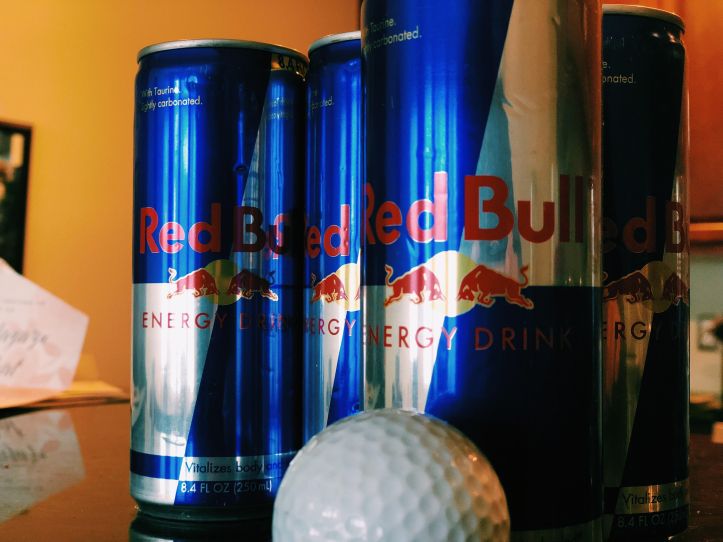
Most golfers and golf fans would agree that Masters Week is the most exciting time of year in the golf world. For four days, millions of viewers will tune in to watch the best players in the world play 72 holes at Augusta National. During these 72 holes, the companies that sponsor these athletes will be provided with hours of on-air time. From the KPMG logo on Phil Mickelson’s hat, to the AT&T logo on Jordan Spieth’s golf bag, advertisers are making their mark on these golfers. Most young fans don’t even know what kind of company KPMG is, they only know the logo from Mickelson’s hat. Brands and logos dress these players from their shirts to their golf bags, and when most young fans recall their favorite player, they can easily recall the brands that these players display on their wardrobe or equipment. However, two of the world’s most famous golfers, Rickie Fowler and Tiger Woods, will be representing two different brands that manufacture the same type of product: energy drinks. Studies over the past three years have shown that caffeine consumption may have a positive effect on one’s golf game.2 However, caffeine consumption by children and teenagers can lead to adverse effects, such as anxiety, trouble concentrating, and trouble sleeping.3
A few weeks ago, I noticed an interaction between a dad and his son at the Wawa in Avalon, New Jersey. Both the dad and son were dressed in cold-weather golf apparel, likely preparing to go play a round of golf. The dad was waiting in line, holding a breakfast sandwich and a bottle of apple juice. A few moments later, the son, who appeared to be no older than 14 years of age, joined his father in line. The next thing I heard was “absolutely not!” I glanced over to see the son holding a Pop-Tart and a can of Red Bull. “Put it back,” said the dad. The son’s response? “But Rickie Fowler drinks it!” I was witnessing the success of a sponsorship in professional sports, but at the same time, I was witnessing the drawback of a player that young athletes look up to representing a product that is not suitable for young athletes.
Every time Tiger Woods walks back to his Caddy to grab a club, Monster Energy Drinks earns a great deal of screen time, sitting front and center on the pocket of his golf bag. Similarly, every time Rickie Fowler wipes a club with his Red Bull towel or takes a sip from his Red Bull water bottle, viewers are familiarizing themselves with seeing Rickie next to the Red Bull logo. While golfers need money from sponsors to fund their passion, are energy drink sponsors setting a good example by advertising in a sport that isn’t typically associated with energy drinks? Young golfers look up to their favorite players on the PGA tour and like to play, train, dress, and eat like the players do. As soon as Rickie started showing off his famous Puma hat on the PGA tour, tens of thousands of junior golfers started wearing the same style of hat. If junior golfers think that Rickie is downing a Red Bull every round, will junior golfers wish to do the same? Might it be a more ethical move for these big-name golfers to chase after sponsors that would enforce healthy habits among junior golfers? Perhaps. Hopefully a PGA tour player will show up one of these days with a Whole Foods logo on their bag. Until then, parents will have to actively steer their young athletes away from energy drinks.
Sources
- US National Library of Medicine (2016, January 28) Effect of Caffeine on Golf Performance and Fatigue during a Competitive Tournament. Retrieved from https://www.ncbi.nlm.nih.gov/
- Professional Golfers Association (2015, August 29) Study: Caffeine may help your golf game. Retrieved from https://www.pga.com/
- US National Library of Medicine (2010, June 1) Caffeine Use in Children: What we know, what we have left to learn, and why we should worry. Retrieved from https://www.ncbi.nlm.nih.gov/
